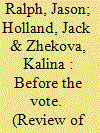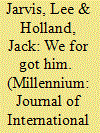|
|
|
Sort Order |
|
|
|
Items / Page
|
|
|
|
|
|
|
| Srl | Item |
| 1 |
ID:
157608


|
|
|
|
|
| Summary/Abstract |
The literature of recent UK policy toward Syria focuses on the 2013 chemical weapons crisis. We examine policy discourses leading up to that. The government supported the removal of Assad but faced the challenge of explaining how that would be realised. Given its unwillingness and inability to mobilise support for military intervention, or to tailor policy goals to match available means, government strategy arguably lacked credibility. Our purpose is to examine how the government tried to close this ends means gap and how, having failed to do that, its ‘discursive strategy’ legitimised its approach. We argue the resources for the government’s discursive strategy on Syria can be found in the earlier articulation of ‘liberal conservatism’. A policy that from an ideal-liberal or ideal-conservative position might have been criticised as half-baked was maintained by a strategy that gave consideration to, but did not completely follow through on, either archetype. Drawing on an analysis of 2,152 sources and supplemented by elite interviews, we illustrate how this strategy managed the interplay of two basic discourses: a liberal insistence that the UK should support ‘the Arab Spring’ and a conservative insistence that military intervention was imprudent because ‘Syria was not Libya’.
|
|
|
|
|
|
|
|
|
|
|
|
|
|
|
|
| 2 |
ID:
090727


|
|
|
|
|
| Publication |
2009.
|
| Summary/Abstract |
This paper draws on interviews conducted in the days and weeks after the events of September 11th, 2001, analyzing the transition from "September 11th, 2001" to "9-11." That is, from the discursive void that immediately followed the acts of terrorism in New York, Virginia and Pennsylvania to the apparently self-evident crisis that the events came to represent in the following days and weeks. First, the paper redresses persistent oversights of discourse-oriented work by recognizing and investigating both the agency of the US general public and the context that official responses were articulated in. Second, the paper serves to denaturalize the construction of 9-11 as crisis, questioning the first and pre-requisite stage of the emerging discourse of the "War on Terror." Theorizing void, crisis and their relationship enables an understanding of how the War on Terror was possible and opens a critical space for its contestation.
|
|
|
|
|
|
|
|
|
|
|
|
|
|
|
|
| 3 |
ID:
145736


|
|
|
|
|
| Summary/Abstract |
This article explores how students experience fictional television as part of their broader learning experience. In particular, the article investigates the potential role of fictional television in the development of visual literacy and critical evaluative skills. The article reports the findings of an experiment into critical evaluative viewing, which measures the foreign policy beliefs of students after exposure to two contrasting episodes of NBC's The West Wing. The results indicate that students are influenced by fictional television, but in perhaps unexpected ways. Although nuanced, the findings suggest that students demonstrate and develop critical evaluative skills—and visual literacy—in two different ways. First, students oppose the fictional/political message to which they are exposed. And, second, students reject the options that are presented to them in their totality. The article concludes with a discussion of the implications of these findings for teaching critical evaluative skills and visual literacy.
|
|
|
|
|
|
|
|
|
|
|
|
|
|
|
|
| 4 |
ID:
133553


|
|
|
|
|
| Publication |
2014.
|
| Summary/Abstract |
This article explores how the death of Osama bin Laden was narrated by the Obama administration between the night of his killing and the 2012 State of the Union address. Three aspects of this unfolding story, in particular, are explored: i) descriptions of the operation itself; ii) constructions of bin Laden's life and character; iii) accounts of the significance and likely consequences of his killing. The article argues that the narration of these events was characterised, first, by considerable discursive continuity with the war on terrorism discourse of George W. Bush, and, second, by a gradual removal or 'forgetting' of bin Laden and the circumstances of his death. Each of these dynamics, we argue, contributed to the legitimisation of his killing, demonstrating the importance of narrative remembrance and forgetting alike for the conduct and justification of liberal violence.
|
|
|
|
|
|
|
|
|
|
|
|
|
|
|
|
| 5 |
ID:
110476


|
|
|
|
|
| Publication |
2011.
|
| Summary/Abstract |
Only three weeks after the events of 11 September 2001 (hereafter 9/11), Aaron Sorkin's The West Wing delivered a special one-off episode, outside of usual storylines. The episode, titled 'Isaac and Ishmael', is interesting because it adopts an explicitly pedagogical theme to teach viewers how to think about the events of 9/11. The episode can thus be read as an instance in the wider construction of the meaning of those events. In this respect, this article argues that the production of the episode contributed to notions of rupture and exceptionalism. In addition, despite the potentially 'liberal' and 'academic' lessons given by the show's stars, the extensive contextualisation of the previously incomprehensible events for a dominantly American audience actually relayed, amplified and reinforced the emerging dominant discourses of the Bush Administration. Accepting and repeating official tropes, The West Wing ultimately served to further limit space for debate in the wake of 9/11.
|
|
|
|
|
|
|
|
|
|
|
|
|
|
|
|
|
|
|
|
|